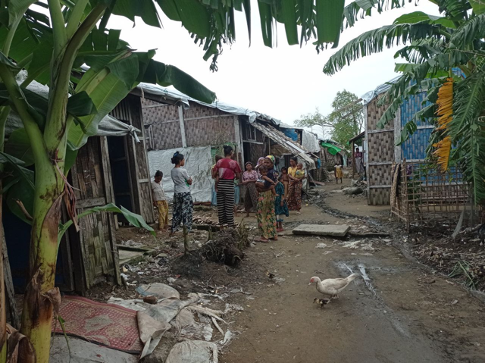Human trafficking has increased significantly this year in Muslim displacement camps in Sittwe, Minbya and Pauktaw Townships in Arakan State, according to camp officials.
According to a list obtained from the displacement camp officials, from January to August 2023, up to 51 displaced persons have been trafficked.
Among them, six were from Thet Kay Pyin camp in Sittwe, five from Ohn Taw Gyi (North) camp, 15 from Ohn Taw Gyi (South) camp, 11 from Baw Du Pha camp, and nine from Nget Chaung camp (1) in Pauktaw Township, and five from displacement camp in Myebon Township, according to reports.
Displacement camp officials said human trafficking cases among the Muslim displaced people, which were minimal in previous years, are now very visible.
“They just want to leave this place as soon as they know they can find work somewhere else. In 2021, NGOs came and conducted educational talks about human trafficking. It’s never been this bad,” said U Aye Kyaw, a person in charge of the Nget Chaung camp in Pauktaw.
Among the trafficked Muslim displaced persons were not only men and women but also girls under 18.
“Some paid agents about six million kyats per person for the work. Either they were arrested or they ended up being trafficked along the way. The main thing is that they take advantage of them who are looking for a way out because there is no work and they cannot move freely,” said Daw Thein Mya, a women’s rights activist from Thet Kay Pyin Muslim camp in Sittwe Township.
Muslim displaced persons face a lack of jobs and financial hardship, and at this time some of them are lured with promises of jobs abroad, the displaced say.
In August, five Muslim displaced persons including ‘Maw Ma Mauk Hsaw Lain’ were deceptively taken from Ohn Taw Gyi (North) camp in Sittwe Township with promises of jobs in Rathedaung Township, and they have had no contact since, according to family members.
“They called and demanded four or five million kyats if we want our son back. They threatened to kill him if we don’t pay. But we don’t have that much money to pay yet. We still have no contact with our son,” said Daw Maung Tars Bay Gaung, the mother of Maw Ma Mauk Hsaw Lain.
Regarding the case, the family has filed a complaint with Sittwe Township Police Station No. 1 and Mansi police outpost, according to family members.
Some trafficking victims who had paid ransom managed to escape, while others died because they could not pay the demanded money, the displaced people said.
The Muslim community believes that the increase in human trafficking cases in Muslim displacement camps is due to several factors, including lack of awareness and knowledge about human trafficking, vulnerability, and looking for a way out because of the lack of freedom of movement.
According to Anti-Trafficking Task Force (Sittwe) Unit No. 5 records, as of September, six trafficking cases were reported in 2018, none in 2020, none in 2021, one in 2022, and none yet in 2023.
These records only reflect reported cases, and there are also many unreported cases of human trafficking, it’s learned.
“However often human trafficking occurs, there is not enough law enforcement. We have to deal with the situation according to our own knowledge. That’s why we want to provide a lot more awareness,” said an anonymous Muslim man from Ohn Taw Gyi (South) camp in Sittwe Township.
Under Section 14 of the 2018 law, trafficking of women and children is punishable by 10 years to life imprisonment, and Section 25 states that trafficking of persons other than women and children is punishable by 5 to 10 years imprisonment.
Sent by DMG.

